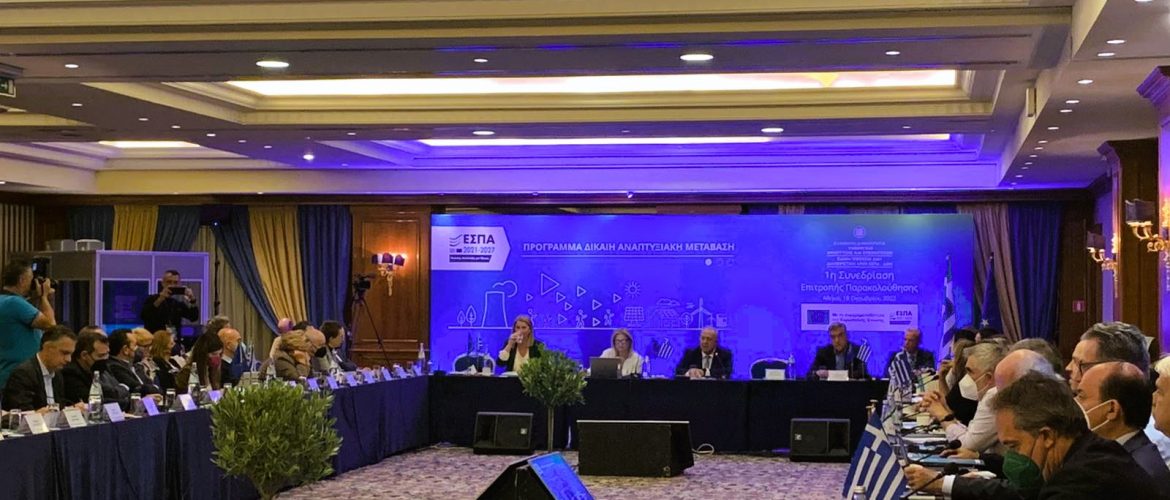The Monitoring Committee of the Just Transition Development Program (JTDP) 2021-2027 held its first meeting on October 18, 2022, marking the beginning of the implementation phase of the Just Transition plan in Greece.
The Monitoring Committee was established with the Decision No.84408/09.09.2022 of the Deputy Minister of Development & Investments (Greek Government Gazette 4757/B/9.9.2022), and consists of 54 voting members and 23 non-voting members. The Chairman of the Monitoring Committee is Mr. Pelopidas Kalliris, Special Service for Just Development Transition. The Green Tank participates as a voting member in the Committee, as a civil society organizations representative.
The 2021-2027 JTDP together with the Territorial Just Transition Plans for the regions of Western Macedonia, Megalopolis and the North and South Aegean Islands were adopted on June, 16 2022 and were the first in the European Union to receive the approval of the European Commission. Since then, the Special Service for Just Development Transition and the Administrative Authority of NSRF – Just Development Transition have proceeded with the first specification of the actions, the formulation of the methodology and selection criteria of the specification acts, as well as the scheduling of the relevant calls. All these items were presented at the October meeting.
The first specification act includes 11 actions with a total budget of €161.5 million and the publication of the calls is planned for the 4th trimester of 2022. These concern “Priority 1 – Strengthening and Promoting Entrepreneurship”, which includes 4 actions with a total budget of €40.8 million, “Priority 4 – Just Labour Transition”, which includes 3 actions with a total budget of €88.2 million, and “Priority 6 – Technical Assistance”, which includes 4 actions with a total budget of €32.5 million. These were approved by the Monitoring Committee.
The Deputy Minister of Development and Investment, responsible for the issues of Just Development Transition, Mr. N. Papathanasis, opened the meeting. Representatives of the European Commission, the Local Authorities of the regions in transition, the University of Western Macedonia and the University of Peloponnese, as well as economic and professional bodies, civil society and competent administrative bodies attended the meeting.
In this 1st meeting, the JTDP was once again presented, and the communication and promotion plans were updated. The broader planning for the next period was also discussed, namely the actions planned for the next specification phase within this year, such as the actions on energy communities, the Innovation Zone technology park and the Hydrogen Hub project. This was followed by an update on the framework governing the Necessary Additional Conditions and the requirements of the Regulations regarding evaluation of the programming period 2021 – 2027. Moreover, the most important elements to be included in the draft evaluation of the JTDP as well as the relevant time milestones for its preparation were put on the table. A separate topic of discussion were the actions to support beneficiaries through the Technical Assistance Programme, with a total budget of €100 million, the content of the ESF+ Regulation, and the relevant actions implemented by the Just Transition Fund.
In the discussion that followed, Nikos Mantzaris stressed that it is necessary to give immediate priority to the support of non-profit energy communities established by citizens or local authorities in lignite regions for two reasons: first, there is a great need to reduce energy costs due to the energy crisis and, second, there is a rising interest by citizens in energy communities in these regions. To this end, he proposed the immediate activation of funds from the NSRF-JTDP to cover part of the cost of installation of renewable energy projects exclusively by non-profit energy communities, as well as the immediate funding of projects that strengthen the electricity grid in order to accommodate projects by energy communities. In addition, he proposed the establishment of specific carbon footprint reduction indicators for Priority 1 investments in businesses, in line with the programme’s central objective which is to contribute to climate neutrality. To support young people, who are by definition the future of the lignite regions, he proposed the introduction of a specific indicator to curb youth drain in lignite regions and the creation of a Youth Fund from existing national and European resources. Lastly, he queried the reduction in the funding for the restoration of lignite regions (from EUR 300 million to EUR 200 million), questioning its adequacy, and asked about the progress of the specific urban plans, which will determine land use and therefore the extent and type of the restoration to be carried out. The answer provided concerned only the issue of the reduction in funding, which was attributed to the smaller size of land area that was eventually transferred to the State by the PPC.



